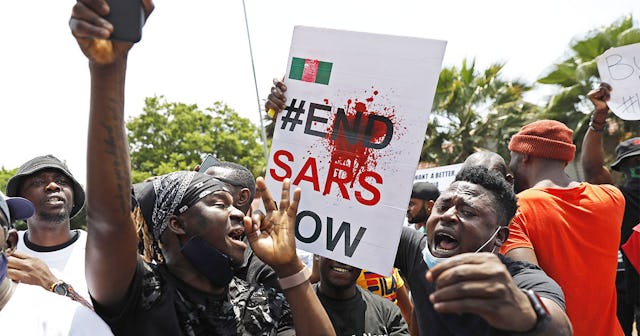Why The #EndSARS Hashtag Has Gone Viral

If you’re on social media, you’ve probably been seeing posts with the hashtag #EndSARS. And there’s a good chance you have no idea what exactly that means.
I admit, I didn’t at first either. The hashtag started in Nigeria in response to recent police brutality. SARS is a special policing force created by the Nigerian government in a response to growing crime back in the 1990s. In recent years, the SARS force has been accused by any Nigerians, especially the younger generations, of severely abusing their power. This month, things are coming to a head, and Nigerian citizens are using social media to make changes.
“#endSARS is more about survival. These are young men and women who are being killed by those who are supposed to protect them, and who are fighting for their life,” Aisha Yesufu, co-organizer of the Bring Back Our Girls movement told Time.
SARS stands for Special Anti-Robbery Squad. The group has existed in Nigeria for almost three decades, and as time goes on, they become more and more corrupt. Citizens are accusing the police and army officers who work for the unit of abusing their power for years. Officers in plain clothes target younger people, stopping them for perceived wrongdoings. Amnesty International has said they’ve recorded 82 abuses of power by SARS agents in the last three years. Some of those abuses include beatings, sexual assault, waterboarding, mock executions and hangings.
On Tuesday, October 20th, multiple reports say the Nigerian army and police opened fire and killed at least 12 protestors in Lagos. There was a peaceful demonstration in support of #EndSARS happening at the Lekki Toll Gate when bullets began to spray the crowd. At the Alausa protests, policemen from the Rapid Response (RRS) Unit and soldiers attacked protestors, killing at least two people and leaving another critically injured. Reports are also saying that CCTV cameras were cut and the electricity went off before the police started shooting. But thanks to protestors on the ground flooding social media, the world can see what was happening in real time.
“A lot of us at the forefront are terrified for our lives. We’ve never lived through anything like this in Lagos. We watched people get killed yesterday on social media,” Lagos based screenwriter Jola Ayeye told Time.
Obianuju Catherine Udeh, a Nigerian DJ known as DJ Switch, went live on Instagram Tuesday the 20th from Lekki. During her live, her more than 50,000 viewers saw the army firing into the crowd. According to Time, young women are the ones leading the charge in the #EndSARS movement. In addition to DJ Switch, Jola Ayeye hosts a podcast with Feyikemi Abudu. These women are using their social media platforms to help spread information. They’re also raising and distributing money for those on the ground to help with things like legal assistance or medical bills. Abudu runs a start-up, involving herself with the movement earlier in October.
PHILL MAGAKOE/AFP/Getty
“This is the first time, at least in my lifetime here, that people are saying ‘enough is enough’,” she told Time. Abudu and Ayeye first started talking about SARS in 2017, the first time people started speaking out against the organization.
While Nigerians have been sharing their frustrations with SARS three years ago, things really came to a head this month. At the beginning of October, footage of of SARS police officers at a Lagos hotel dragging two men out and shooting one reignited the #EndSARS movement. Much like the killing of George Floyd back in June of this year, something felt different. This blatant display of police brutality was the straw that broke the camel’s back. Nigerians could no longer allow their pleas to go unheard. So they took to the streets. Then came the night of October 20th. And again, just like the world took notice of the U.S. back in June, they took notice of Nigeria.
Soon, the #EndSARS hashtag was going viral. Global news outlets began reporting on the atrocities the police and army have been inflicting on citizens. “Nigeria’s Independence Day is Oct. 1, 1960. But Oct. 20, 2020, will go down in Nigerian history as the day the whole world saw images of the green-and-white striped flag stained with the red blood of protesters bludgeoned by the forces of the state,” writer Karen Attiah wrote in an Op-Ed for The Washington Post. And according to Amnesty International, who has been monitoring the situation since October 8th, say “at least 56 people have died across the country since the protest began, with about 38 killed on Tuesday alone.” They also say that approximately 38 people died on October 20th.
Leon Neal/Getty
As the #EndSARS hashtag began to spread, it led to stars like Rihanna, Cardi B and even Beyonce speaking out on the subject. The global pressure is forcing the Nigerian government to do something. On October 11th, the Nigeria police force made the announcement that they would disband the SARS unit, multiple sources announced. President Muhammadu Buhari then turned around and created SWAT, aka Special Weapons and Tactics. So you’re basically deploying one dangerous task force for what is likely another.
It’s hard not to look at what’s happening in Nigeria and not think about what was happening here in the summer. Police brutality isn’t just an American problem, as we can now see. The #EndSARS movement is important because it’s giving a voice to the voiceless. And it’s enabling the people who are suffering in silence without much support. Movements like this and Black Lives Matter begin because people feel powerless. The key is using what we have to help those who need us.